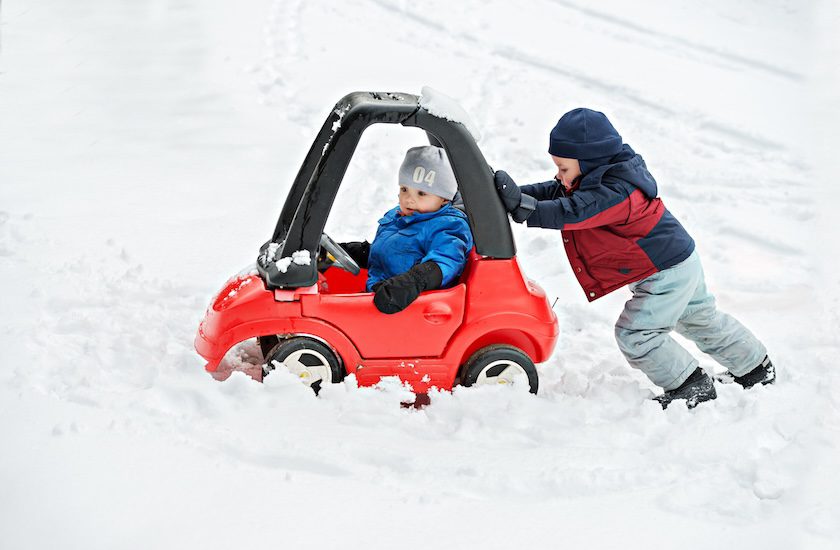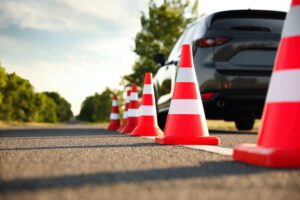What Should You Do When Driving in Snowy Conditions?

If you’re learning to drive, you might get this question on your driving theory test:
What should you do when driving in snowy conditions?
Use sidelights only.
Be prepared to steer sharply.
Brake firmly and quickly.
Brake gently, and in plenty of time.
The answer is d: When driving in snowy conditions, you should brake gently in plenty of time.
What Makes Driving in Snowy Conditions Difficult?
In snowy conditions, you’ll have less visibility, less traction, and less control over your steering, acceleration, and braking. If you brake sharply on the snow, your car may skid. Similarly, steering sharply on the snow may cause you to lose control.
Drive Slowly in the Snow
To stay safe while driving in snow, it’s best to drive slower than you normally would, and to keep as big a distance as possible from any other road users. This will give you plenty of time to react to any changing road conditions. And if you brake gently, you’ll be able to maintain control of your car while avoiding skidding.
How to Drive in the Snow
Plan your route carefully – Allow extra time for your journey so that you’re not tempted to rush. Stick to main roads, as these are more likely to be gritted and well-lit.
Prepare your car for winter – Pack an emergency winter kit that includes blankets, a de-icer, an ice-scraper, a torch with spare batteries, and a shovel. If you live in a particularly icy area, consider getting winter tyres for your car.
Prepare your car for journeys – Remove all the snow from your car before you set out, including all the snow on the roof. Make sure your windscreen’s fully de-iced and demisted before you start moving. Ensure all of your key fluid levels are topped up, including your oil, your windscreen wash, and your brake fluid.
Take care on hills – Try to keep a constant speed when driving uphill so that you don’t have to change gear. And when driving downhill, slow down before you reach the hill, choose a low gear, and try to avoid braking.
Read our full guide to staying safe in snowy conditions.
Dos and Don’ts
Do:
Ensure your tyres have adequate tread depth, for maximum grip and more reliable braking.
Make sure your wiper blades are not worn out, and that you’re using a screen wash that’s suitable for icy conditions.
Check all the lights on your car are in good working order.
Wear sunglasses if it’s bright and sunny, to reduce the glare from the snow.
Don’t:
Leave home without ensuring your fuel tank is at least half-full. You don’t want to get stranded out there!
Throw hot water over your windscreen to quickly de-ice it, as this can cause it to crack. Instead, use a de-icer and an ice-scraper.
Drive fast or recklessly. As much as possible, stick to low gears, moderate speeds, graceful turns, and gentle braking. And keep as much distance as possible from the car in front.
Read our full guide to the do’s and don’ts of driving in snow.
Ready For Your Theory Test?
We’ve put together a detailed guide full of tips that will help you pass your theory test first time. Our guide includes essential information about the test, so that you’ll know what to expect on the day. It also features numerous hints and links to help you get to grips with the test so you can pass with flying colours.
Access our driving theory test guide.
Learner Driver Car Insurance
If you want to build up experience as a learner beyond your structured driving lessons, you’ll need someone to supervise you. You’ll also need car insurance to cover you.
At Go Girl, we offer learner driver insurance that will give you all the cover you need at a competitive price. Get a quote and instant cover online in minutes.






